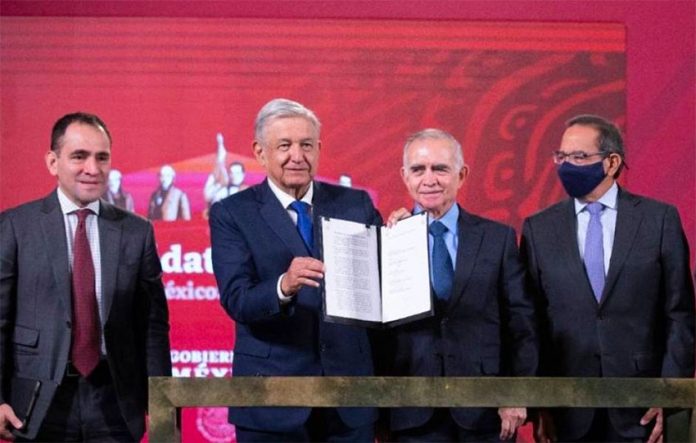The federal government and the private sector have signed a deal to carry out 39 infrastructure projects with a total investment of 297.3 billion pesos (US $13.9 billion).
Speaking at his regular news conference on Monday, President López Obrador said the pact will generate jobs and greater wellbeing for the Mexican people.
In the presence of several prominent business leaders including Carlos Slim, Mexico’s richest man, López Obrador said the government has had “a lot of support” from the private sector and asserted that the two parties will continue to work together.
“[This is] just the beginning, … there will be more investment,” he said.
The new agreement encompasses projects in the communications and transportation, energy, and water and environment sectors, some of which have already been announced.
There are more than 20 projects to build or upgrade roads in several states including México state, Nuevo León, Oaxaca, Aguascalientes, San Luis Potosí, Chihuahua, Chiapas, Campeche, Veracruz and Tabasco.
Almost 14 billion pesos will be spent on building road links to the new Mexico City airport, which is currently under construction at the Santa Lucía Air Force base north of the capital.
There are also plans to build a new 511-million-peso cruise ship dock in Cozumel, Quintana Roo, and a new section of railroad to connect Mexico City’s suburban train to the capital’s new airport. The rail project has a price tag of 12.56 billion pesos.
Perhaps the most ambitious project in the new public-private pact is the construction of a new train line between Mexico City and Querétaro. Construction of the 51.3-billion-peso project is slated to begin in June 2021.
The high-speed passenger train was going to be built by the previous federal government but was scrapped in 2015 by budget cuts.
The agreement also includes a 4-billion-peso project to expand and modernize the port in Progreso, Yucatán, and a 2.8-billion-peso plan to build a new border crossing to southern California.
Via a “strategic alliance,” the government and the private sector intend to complete five energy sector projects.
They will invest 2.52 billion pesos to upgrade an ethane plant in Veracruz and 1.15 billion pesos to modernize a fertilizer plant in Chihuahua.
The largest public-private investment among the 39 projects is 54.7 billion pesos for the installation of a coker unit in Pemex’s oil refinery in Tula, Hidalgo.
More than 15 billion pesos will be invested in the rehabilitation of a coke plant at the refinery in Cadereyta, Nuevo León, and 25.2 billion pesos will be spent on the liquefaction unit at the refinery in Salina Cruz, Oaxaca.
The government and the private sector have also agreed to invest 1.6 billion pesos in wastewater management in Naucalpan, México state, and 494 million pesos to build a water supply system at the new Mexico City airport.
The president of the Business Coordinating Council (CCE), an umbrella organization representing 12 business groups, said the agreement serves as new evidence that López Obrador is committed to collaborating with the private sector on investment projects.
(The government and the private sector previously committed to work together on a US $42.95 billion National Infrastructure Plan encompassing 147 projects in its first stage).
“The private sector and the president committed to promote public and private investment in our country,” said Carlos Salazar, adding that the aim is to invest jointly an amount equivalent to 25% of GDP.
To spur the economic recovery from the coronavirus-induced downturn, Mexico also needs to make the most of the new North American free trade agreement, the USMCA, as well as improve security conditions and invest in tourism, the CCE chief said.
Alfonso Romo, the head of the president’s office and López Obrador’s point man for government relations with the business sector, said that private investment is the “best vaccine” against the current economic crisis.
“Private consumption will recover slowly. The best vaccine that Mexicans have to fight against the economic paralysis is private investment. Private investment is [our best] hope to overcome the crisis because it represents 87% of total investment in the country, and it’s vital for growth and wellbeing.”
Source: Reforma (sp), El Financiero (sp)
